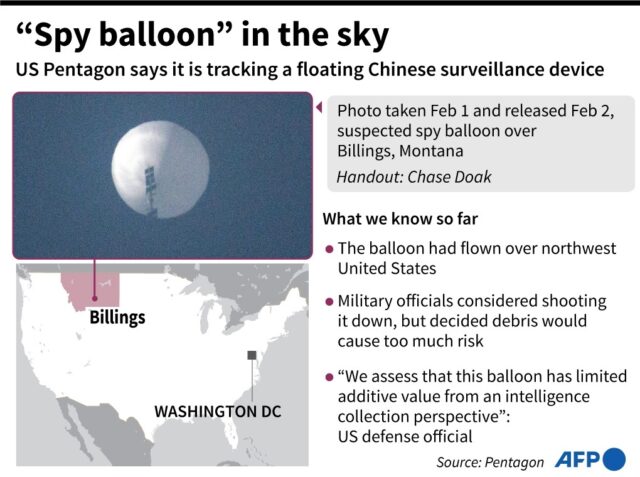A large Chinese spy balloon has been detected high above the continental United States, according to the Pentagon.
The discovery has put the militaries and intelligence services of the United States and Canada on alert, but the Pentagon has said it does not plan to shoot it down.
Where is it, and how big is it?
A US defense official said the balloon entered US airspace “a couple days ago” but its exact location has not been shared.
Officials told US media it flew over the vast state of Montana, which borders Canada, and at an altitude well above commercial air traffic.
The balloon flew over the Aleutian Islands in the northern Pacific Ocean, and then crossed Canadian airspace into the United States, US media said, citing defense officials.
The same reports cited the official as saying the balloon was as large as three buses.
Separately at a background media briefing, a senior US defense official declined to share precise dimensions.
“But there have been reports of pilots seeing this thing, even though it’s pretty high up in the sky,” the official added.
“So, you know, it’s sizeable.”
How do we know it is Chinese?
The senior Pentagon official said the United States had “very high confidence” that it is a Chinese balloon.
“We do not doubt that this is a PRC balloon,” the official said, using an acronym for the People’s Republic of China.
China said it was working to verify the US claim.
“Until the facts are clear, making conjectures and hyping up the issue will not help to properly resolve it,” Chinese foreign ministry spokeswoman Mao Ning said.
“We have no intention of violating the territory or airspace of any sovereign country.”
Why has it not been shot down?
The balloon is large enough that destroying it would rain down debris, risking the safety of people on the ground, US officials said.
The Pentagon considered options including shooting it down over sparsely populated areas, but assessed the risk was still too high, the senior defense official added.
“Does it pose a threat to civilian aviation? Our assessment is it does not. Does it pose a significantly enhanced threat on the intelligence side? Our best assessment right now is that it does not,” the official said.
“We assess that the risk of downing it, even if the probability was low… of the debris falling and hurting somebody or damaging property that it wasn’t worth it.”
What is it spying on?
The balloon’s path takes it over “a number of sensitive sites,” the senior Pentagon official said when asked about the presence of nuclear missile silos in Montana.
“Clearly, they’re trying to fly… this balloon over sensitive sites… to collect information,” the official added.
However, the balloon’s tech is not “revolutionary” and its observations are not better than what China is capable of seeing through other means such as its spy satellites, the official said.
“This balloon has limited additive value from an intelligence collection perspective.”
Both the United States and Canada, however, said they were taking steps to protect against foreign intelligence gathering.
Is this the first Chinese spy balloon over the United States?
China has sent such balloons over the United States in recent years, the senior Pentagon official said.
The official did not share details, but indicated the flights were detected as far back as the administration of the previous president Donald Trump.
However, the official added, this is the first time a Chinese balloon has stayed in US airspace for an extended period.
Haven’t satellites made spy balloons obsolete?
Balloons have been used for military and espionage purposes for well over a century, including by the United States after World War II.
But the advent of the space age and advances in aviation meant satellites and high-flying spy planes could look at enemy territory more reliably, rendering balloon spying largely obsolete.
However, modern balloon development projects are under way in several countries, including the United States, China and France.
Experts say balloons are cheaper to build and operate and can stay airborne for long periods.
“It’s just phenomenal what we’re able to do with high-altitude balloons,” US Army Lieutenant General Daniel Karbler told the specialist military site Defense News in 2020.
He described the cost as “pennies on the dollar” compared with other options.
China has also invested in the development of military balloons, showing off a smaller, tethered model at the Zhuhai Air Show in 2021 that state media said was capable of reconnaissance and threat detection.
Such projects can pose national security threats, said General Frederic Parisot, vice chief of the French air force.
“In the future, we will have balloons above our heads for several months at a time, which could compromise our activities at a lower cost than from space.”
burs-qan/axn

COMMENTS
Please let us know if you're having issues with commenting.